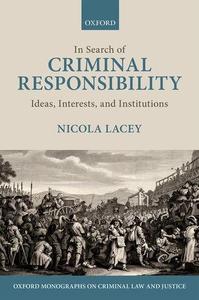
Free Download In Search of Criminal Responsibility: Ideas, Interests, and Institutions By Nicola Lacey
2016 | 200 Pages | ISBN: 0199248206 | PDF | 13 MB
What makes someone responsible for a crime and therefore liable tof punishment under the criminal law? Modern lawyers will quickly and easily point to the criminal law's requirement of concurrent actus reus and mens rea, doctrines of the criminal law which ensure that someone will only befound criminally responsible if they have committed criminal conduct while possessing capacities of understanding, awareness, and self-control at the time of offense. Any notion of criminal responsibility based on the character of the offender, meaning an implication of criminality based onreputation or the assumed disposition of the person, would seem to today's criminal lawyer a relic of the 18th Century. In this volume, Nicola Lacey demonstrates that the practice of character-based patterns of attribution was not laid to rest in 18th Century criminal law, but is alive and well incontemporary English criminal responsibility-attribution.Building upon the analysis of criminal responsibility in her previous book, Women, Crime, and Character, Lacey investigates the changing nature of criminal responsibility in English law from the mid-18th Century to the early 21st Century. Through a combined philosophical, historical, and socio-legalapproach, this volume evidences how the theory behind criminal responsibility has shifted over time. The character and outcome responsibility which dominated criminal law in the 18th Century diminished in ideological importance in the following two centuries, when the idea of responsibility asfounded in capacity was gradually established as the core of criminal law. Lacey traces the historical trajectory of responsibility into the 21st Century, arguing that ideas of character responsibility and the discourse of responsibility as founded in risk are enjoying a renaissance in the moderncriminal law. These ideas of criminal responsibility are explored through an examination of the institutions through which they are produced, interpreted and executed; the interests which have shaped both doctrines and institutions; and the substantive social functions which criminal law andpunishment have been expected to perform at different points in history.
Please Help Me Click Connect Icon Below Here and Share News to Social Network | Thanks you !
